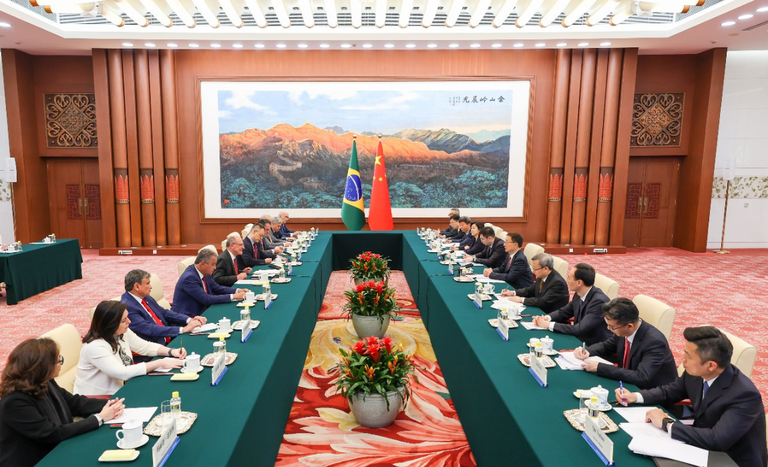Notícias
OFFICIAL MISSION
At COSBAN, Minister Fávaro highlights strong Brazil-China trade relations
As Brazil and China celebrate 50 years of diplomatic relations, Minister of Agriculture and Livestock Carlos Fávaro participated in the VII Plenary Session of the China-Brazil High-Level Coordination and Cooperation Commission (COSBAN) on Thursday (6) in Beijing. The event was part of an official mission led by Vice President and Minister of Development, Industry, Trade, and Services, Geraldo Alckmin.
"COSBAN was highly successful, showcasing the spectacular state of Brazil-China relations. China is one of the main destinations for Brazilian agricultural exports. President Lula is committed to strengthening these ties," emphasized Minister Fávaro.
COSBAN is the primary mechanism for regular bilateral dialogue with China and one of Brazil's most comprehensive platforms with international partners. It is co-chaired by the vice presidents of both countries—Geraldo Alckmin of Brazil and Han Zheng of the People's Republic of China. Its purpose is to supervise and execute the bilateral agenda in strategic areas for both nations.
During the session, eight intergovernmental instruments were signed, and 30 outcomes were announced, along with 11 private sector agreements in areas such as agriculture, finance, environment and climate change, trade, industry, communication, health, education, culture, outer space, energy, small and micro-enterprises, social and rural development, and science, technology, and innovation.
Among the agreements was the approval of the sanitary and quarantine requirements for Brazilian pecans. Brazil can now export pecans to China, potentially generating business exceeding $1 million.
Minister Fávaro also highlighted other agreements achieved during the mission, such as expanding opportunities for Brazilian coffee in China. The Federal Government secured a deal to promote Brazilian coffee in China’s largest coffee chain. The agreement includes the purchase of approximately 120,000 tons of Brazilian coffee, valued at around $500 million.
"Three years ago, Brazil exported only $80 million worth of coffee to China. Last year, it increased to $280 million. Now, this single company has formalized another $500 million. This opens up opportunities for Brazilians, creating more jobs and income," Fávaro explained.
The minister also emphasized the importance of dialogues during the mission about the National Program for the Conversion of Degraded Land into Sustainable Agricultural and Forestry Production Systems (PNCPD). The goal is to attract more international support for the initiative. "Brazil is making significant strides in sustainable production. We are working on a national program to recover degraded lands, aiming to increase productivity in 40 million hectares without cutting down a single tree," he said.
AGRICULTURAL TRADE RELATIONS
China is the main destination for Brazilian agricultural exports. In 2023, sales to the Chinese market reached a record $60.24 billion, accounting for 36.2% of Brazil's total agribusiness exports.
Additionally, China was the biggest driver of growth in Brazilian agribusiness exports last year, contributing to an increase of $9.53 billion compared to 2022.
Among the top ten products exported by Brazil, which represented 78.8% of the sector's export portfolio, China was the main destination for eight products: soybeans, corn, sugar, beef, poultry meat, cellulose, cotton, and pork.
Conversely, Brazilian imports from China in 2023 totaled approximately $1.18 billion, including forest products, fibers, and textiles, demonstrating the diversity of trade relations between the two countries.
Notably, in March 2023, China granted approvals to 38 Brazilian plants simultaneously, covering 34 slaughterhouses and four cold stores. This was the largest number of approvals granted at once in the history of Brazil-China trade relations.
In the first four months of 2024 only, Brazil exported $17.09 billion worth of agricultural products to the Chinese market.
Press Information
imprensa@agro.gov.br

